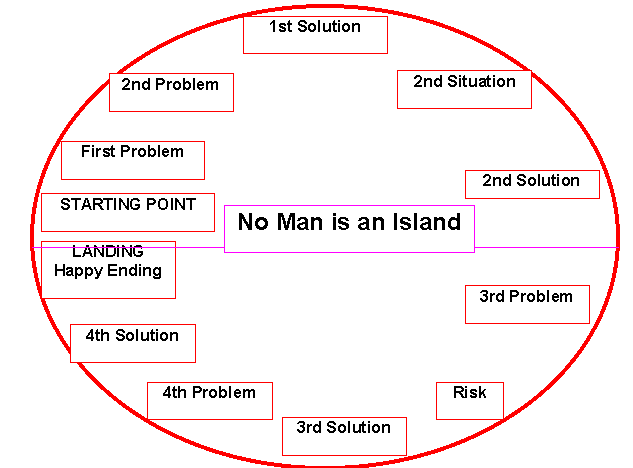Table of Contents
Standards in
Reading Comprehension
Note taking:
A variation
Table of Contents |
Taking notes forever?! | HOME |
back to
Standards in Reading Comprehension |
go on to
Note taking: A variation |
1. General ideas
Your teachers often ask you to take notes. You say that this is something you don't like at all. Why is that? Because you don't know how to take notes and why you should take them although you take notes all the time. You don't think so? Well, let's take an example:
You have watched a tennis match on TV, but your friend hasn't. So he/she is curious to know:Who won?
How many sets did he/she need?
What were the results of the different sets?
When did the winner have the first break?
Was he/she in good form?
Was it a good match?You can answer all your friend's questions. You didn't realize up to now that you took notes, i.e. that you had stored all these pieces of information, but you had simply remembered, because you had followed the match with enthusiasm. You didn't need a sheet of paper and a pencil to write down the most important facts so that you could recall the details.
But you are not always so interested in news that you can remember the details after a while. Sometimes you must remember whether you like it or not . So it's good to practise the skill of taking notes. With it you can get a survey, you help your memory and you practise summing up.
2. First step: Separate the important from the unimportant /SkimmingPerhaps you haven't still noticed how many different ways there are of taking notes, but there are a lot you have already done without knowing. Before pointing out some of the ways of taking notes I want you to accept one simple rule:
The more different facts or persons or activities or dates or places or reasons there may be found in a spoken or written text, the more notes you must take before your inner eye or in writing.The reason is simple: Your brain has to do a lot of other activities apart from remembering facts. So why not try to help it?
The first thing you've got to do and you normally do is:
Separate gold from trash!
What does this mean? Perhaps you can find out yourself by the following example:"Hi, I'm ....
My...has a .....not far from...
I should be at ....today, but I have to ....my...to .... the .... in
My ... ...."You have got 4 sentences with 23 words, only 12 words are missing. What is this statement about?
If you have a closer look at the gaps you can find that you can say something about the missing words:"Hi, I'm (name of the speaker)
My (person) has a (thing) not far from (place)
I should be at (name of a place or institution.) today, but I have to (activity)my(person) to (activity) the (thing) in.
My (person)(activity)."Can you tell the statement now?
It may run as follows:
"Hi, I'm Robot 49XY.
My spaceship has a break not far from Venus.
I should be at Jupiter today, but I have to load my batteries to take the energy in.
My commander rages."Or:
"Hi, I'm Paul Christiansen.
My family has a farm not far from Seattle.
I should be at school today, but I have to help my mom to get the hay in.
My teacher understands."Sebastian Fink, class 8d of the Clemens-Brentano-Realschule, Koblenz, found the following solution:
"Hi, I'm C3PO. My master has a spaceship not far from Naboo. I should be in repair today, but I have to help my master to get the credits in. R2D2 understands."Why is it possible to get three completely different texts out of 23 words with only 12 words missing?
The fact is that there are two different kinds of words. In order to make this clear I want you to see construction workers building a house. They need two different materials for that: cement or mortar and building stones or bricks.
If you take mortar only you can't get a certain form because it flows wherever there is a way. It's the stones that give the house the shape.
 |
|
Engin Göher, class 8d of the Clemens-Brentano-Realschule, Koblenz,made the following drawing: |
|

So there are certain words which function like mortar (so-called functional words) and others which bear shape or meaning (so-called key-words) which open the lock to your understanding and memory. Among the key-words there are nouns, verbs, negatives, numbers and some adjectives or adverbs.So you will find a lot of functional words in the example above.
It's easier for you to reconstruct a statement out of the following key-words that you have underlined in a text:Sarah Rosenbaum
moved --Denver,Colorado
Dad - job - computer company
before - Baltimore
hobby - music - cello + guitar (bad) : country group
better Mom - birthdayNow try to retell this statement.
So when you want to remember the contents of a conversation, news, statement, a film or a story the first task is to separate key-words from functional words:
The question is what to keep and what to leave.
3. Second step: Find an order
But whether or not you like it you must take notes or you will loose all the facts out of your memory. It's not a matter of learning English alone. You'll face this task again and again, at school, at home, in your family, with your friends. Let's say you go to a film and your friend asks you: ' What was STAR WARS EPISODE 1 about?' Perhaps you have got a feeling about how to tell the most important or impressing facts to your friend. But sometimes your friend is really bored, because he/she doesn't understand what you want to tell him/her. Why that?Because he or she can't get the running thread out of your retold.
If you help him or her to follow an order there will be no difficulty. It's the same with your memory: It needs
ORDER You don't believe? Well then, find out yourself:
You listen to the results of the pools, but you haven't got a paper and a pencil at hand.
The numbers are these:3 - 8 - 19- 27 - 34 - 36 - 41
Please shut your eyes and try to repeat them? You can't? Then you are a very normal person. In all my life as a teacher I had one student who was able to remember the numbers and he was even able to remember them the day after.
Now have another try with the following numbers:
7 - 14 - 21 - 28 - 35 - 42 - 49
Believe it or not: nearly everybody could remember the numbers even days after. Why is that so?
Because there is an order in the second sequence.
So the second thing you have got to do when you want to take notes is the following idea:Which is the underlying order of what is said or written?
This is the point where nobody can help you. You must think for yourself in order to find out the main ideas, facts, persons, dates, places, reasons or activities. And you must concentrate all your energy on thinking together with the speaker or author of a text. If he isn't too good at putting his or her thoughts into an order, help yourself and create your own order. (Think of the figures!)
But you are not all alone. There are some patterns that may help you.
|
|
|
|
|
|
|
|
THINGS |
|
|
|
|
|
| FIRST | |
| SECOND | |
| THIRD | |
| NEXT | |
| THEN | |
| LAST |
| 12 years ago | my uncle came over from Calcutta |
| First | |
| For a year | |
| Then | |
| Two years later | |
| After three years | |
| Today |
| Arguments | |||||
| Topics: | Mr Miller | Mrs Smith | Miss Taylor | Mrs Kent | Mr Robs |
| Water | |||||
| Birds | |||||
| People | |||||
| Electricity | |||||
| Money |
| Dream to be the best in something |
| Dream of becoming the best body-builder in the world |
| (Dream of being a winner) |
| Dream of being listened to |
| Dream of going to America |
| Dream of becoming a businessman |
| (Dream of achieving things) |
| (Dream of making up another dream) |

(Click here for a completed version
and here for the complete Reading comprehension text "The pilot's choice"
4. How to take notes
You take notes when you write down the most important facts in a condensed and informal way. What does this mean? You may use one of the pattern above or simply try to put the notes down in a way that is meaningful to you, makes sense, reveals relations and is as short as possible so that you can repeat the most important facts in complete sentences Besides words or phrases it's short and quick to use signs like these:
| 1st | - |
| 2nd | - |
| 3rd | - |
| --0 | it follows |
| ==0 | is transformed into |
| - | next point |
| 0--0 | is the opposite of |
| = | is the same as |
| + | another one, positive |
| - | another one, negative |
| ? | unclear, doubtful |
| ! | You are so right |
Abbreviations: i.e. = That is or means
e.g. = for example
or whatever helps you to shorten your notes.
5. Last Frame
Now one last frame for your thoughts: Even your thoughts follow a hierarchical order of more or less importance, of being earlier or later in time, nearer or further away in space, more abstract and general or detailed and specific.
|
|
|
||||
|
|
|
|
|
|
|
|
|
ideas | ||||
| Order |
|
|
|||
|
|
|
||||
|
|
|
|
|||
|
|
|
||||
After you've read this text about taking notes you should be able to make notes on "The fine art of taking notes". Please do so.
You may still ask what notes are good for. Well, you can do many things with them, i.e. writing a report or retelling a story or giving a summary or
simply understanding what other people have said or written so that you are not a 'dumb jerk' when you are speaking to your friends, your parents, your teachers or anyone else.
Good luck and a lot of good notes. This may be the only case where good notes may also mean good marks.Ilka Reif and Kerstin Brauer found the following explanation
Table of Contents |
Taking notes forever?! | HOME |
back to
Standards in Reading Comprehension |
go on to
Note taking: A variation |